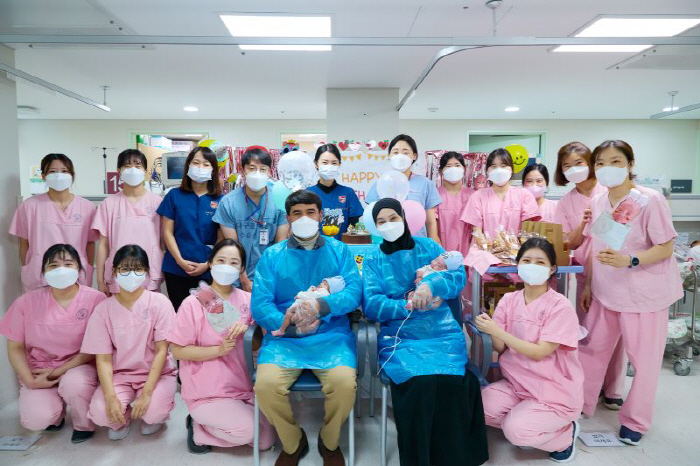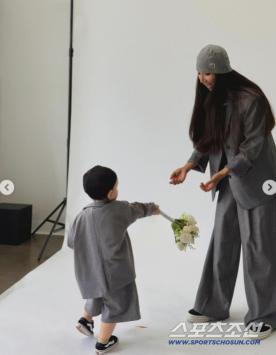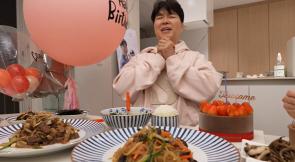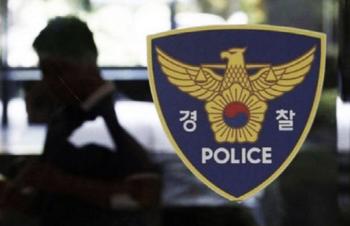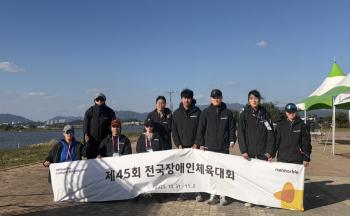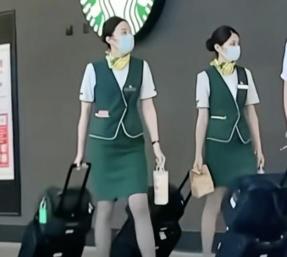Uzbekistan's ultra-low-weight twins saved by South Korean medical technology
Nov 03, 2025
The ultra-low weight Uzbek twin brothers, who were born 590g and 670g at 24 weeks of pregnancy in a strange country, Korea, have celebrated their 100th day of birth thanks to Korea's excellent medical technology and medical system.
On July 20, Uli (Uzbekistan), who was pregnant with twins at 24 weeks of pregnancy, visited an emergency room at a hospital due to unexpected pain. It was a twin premature birth, only 24 weeks and 0 days pregnant, and it was an urgent situation where it was impossible to give birth at the hospital. Korea University Guro Hospital, which has been responsible for the birth of high-risk mothers and the treatment of newborns in the region as a state-designated regional maternal and child care center, quickly decided to transfer and saved three lives.
The first and second Zayed, who were born as ultra-small underweight newborns weighing only 590g and 670g, were admitted to the neonatal intensive care unit of Korea University Guro Hospital immediately after birth and received intensive treatment.
The survival rate of premature babies born at 24 weeks of pregnancy is about 60%, and the two children had to rely on a ventilator as soon as they were born because all body organs, including the brain, heart, and respiratory system, were immature. In addition to the Department of Pediatrics and Neonatal Division, detailed pediatric specialists such as pediatric respiratory organs, pediatric heart, pediatric nerves, pediatric kidney, pediatric endocrine, and pediatric gastrointestinal nutrition, and medical staff in the neonatal intensive care unit continued to closely monitor and treat them 24 hours a day.
Thanks to this, it has overcome various complications such as arterial irrigation, sepsis, pulmonary arterial hypertension, and retinopathy of premature infants, which are common in ultra-small underweight newborns, and both children have grown healthy and are about to be discharged from the hospital.
Professor Shin Seung-hyun of the Department of Pediatrics and Adolescents who was in charge of the treatment said, `Since birth, it has been difficult to breathe voluntarily, so we intubated the organs and maintained breathing on a ventilator, but now both children have gained about 2kg, and the first requires a small amount of oxygen assistance, but both have recovered enough to breathe on their own.' We are proud that specialists and medical staff can cooperate organically to protect children's health whenever there is a crisis. I would like to express my gratitude to the medical staff who did their best and to the children and parents who overcame them well.
Professor Jo Jom-joon of Obstetrics and Gynecology, who was in charge of Uli's cesarean section, said, `It is a very difficult situation for mothers to give birth at 24 weeks of pregnancy, but it was also a very difficult decision for doctors who have to consider the health of their children to be born""Emergency cesarean section was performed because most of the childbirth had already progressed at the time of arrival at the hospital, and after that, medical staff quickly and intensively managed the children in the neonatal intensive care unit. Thanks to this close cooperation and system, children were able to face 100 days in good health," he said.
For these families, the cost of treatment was as difficult as the treatment process.
Hasan Boy is a student studying in Korea, and he had only been in Korea for about three months at the time of giving birth, so Woolley did not have medical insurance ready. In addition, sudden preterm birth caused unaffordable medical costs as two children were hospitalized for a long time in the neonatal intensive care unit.
In response, the medical social work team at Korea University Guro Hospital helped to quickly apply insurance to these families who were in trouble because they were not familiar with the Korean medical system, and also provided financial and psychological support by allowing them to receive medical support from the Namchon Foundation.
Hasan Boy continued to shed tears because he was so frustrated that his wife suddenly gave birth in Korea, where there are no family members, and he could not save the children. I think it was because of the outstanding medical and professional systems of the medical staff of Korea University Guro Hospital that we were able to save babies born in the world in 24 weeks"In addition, thanks to the warm care of the medical staff, all of my family, who had no place to lean on, were able to be emotionally stable, and thanks to financial support, I was able to concentrate on treatment and recovery. I will remember this grace for the rest of my life and do my best to help children grow up healthy and become helpful people in society in the future"I expressed my appreciation.
Choi Eui-kyung, head of the neonatal intensive care unit at Korea University Guro Hospital, said, "The neonatal intensive care unit will continue to fulfill its social responsibilities as a social safety net to protect the lives of precious newborns in the age of low birth, with various specialists such as pediatric thoracic surgery, pediatric neurosurgery, and pediatric rehabilitation medicine collaborating with pediatricians and pediatric rehabilitation."."
Director Min Byung-wook said, `Koryeo University Guro Hospital is a representative medical institution of the maternal and child care cooperation pilot project organized by the Ministry of Health and Welfare and operates a 24-hour emergency response system for high-risk pregnant women and newborns and plays a pivotal role in providing emergency, high-risk delivery and neonatal care more safely and systematically"This case is an exemplary case of a social safety net created by medical institutions, public interest foundations, and local communities beyond the recovery of a family. Korea University Guro Hospital will do its best as a medical institution to continue the hopes of domestic and foreign patients in the medical blind spot."," he stressed.
On July 20, Uli (Uzbekistan), who was pregnant with twins at 24 weeks of pregnancy, visited an emergency room at a hospital due to unexpected pain. It was a twin premature birth, only 24 weeks and 0 days pregnant, and it was an urgent situation where it was impossible to give birth at the hospital. Korea University Guro Hospital, which has been responsible for the birth of high-risk mothers and the treatment of newborns in the region as a state-designated regional maternal and child care center, quickly decided to transfer and saved three lives.
The first and second Zayed, who were born as ultra-small underweight newborns weighing only 590g and 670g, were admitted to the neonatal intensive care unit of Korea University Guro Hospital immediately after birth and received intensive treatment.
The survival rate of premature babies born at 24 weeks of pregnancy is about 60%, and the two children had to rely on a ventilator as soon as they were born because all body organs, including the brain, heart, and respiratory system, were immature. In addition to the Department of Pediatrics and Neonatal Division, detailed pediatric specialists such as pediatric respiratory organs, pediatric heart, pediatric nerves, pediatric kidney, pediatric endocrine, and pediatric gastrointestinal nutrition, and medical staff in the neonatal intensive care unit continued to closely monitor and treat them 24 hours a day.
Thanks to this, it has overcome various complications such as arterial irrigation, sepsis, pulmonary arterial hypertension, and retinopathy of premature infants, which are common in ultra-small underweight newborns, and both children have grown healthy and are about to be discharged from the hospital.
Professor Shin Seung-hyun of the Department of Pediatrics and Adolescents who was in charge of the treatment said, `Since birth, it has been difficult to breathe voluntarily, so we intubated the organs and maintained breathing on a ventilator, but now both children have gained about 2kg, and the first requires a small amount of oxygen assistance, but both have recovered enough to breathe on their own.' We are proud that specialists and medical staff can cooperate organically to protect children's health whenever there is a crisis. I would like to express my gratitude to the medical staff who did their best and to the children and parents who overcame them well.
Professor Jo Jom-joon of Obstetrics and Gynecology, who was in charge of Uli's cesarean section, said, `It is a very difficult situation for mothers to give birth at 24 weeks of pregnancy, but it was also a very difficult decision for doctors who have to consider the health of their children to be born""Emergency cesarean section was performed because most of the childbirth had already progressed at the time of arrival at the hospital, and after that, medical staff quickly and intensively managed the children in the neonatal intensive care unit. Thanks to this close cooperation and system, children were able to face 100 days in good health," he said.
For these families, the cost of treatment was as difficult as the treatment process.
Hasan Boy is a student studying in Korea, and he had only been in Korea for about three months at the time of giving birth, so Woolley did not have medical insurance ready. In addition, sudden preterm birth caused unaffordable medical costs as two children were hospitalized for a long time in the neonatal intensive care unit.
In response, the medical social work team at Korea University Guro Hospital helped to quickly apply insurance to these families who were in trouble because they were not familiar with the Korean medical system, and also provided financial and psychological support by allowing them to receive medical support from the Namchon Foundation.
Hasan Boy continued to shed tears because he was so frustrated that his wife suddenly gave birth in Korea, where there are no family members, and he could not save the children. I think it was because of the outstanding medical and professional systems of the medical staff of Korea University Guro Hospital that we were able to save babies born in the world in 24 weeks"In addition, thanks to the warm care of the medical staff, all of my family, who had no place to lean on, were able to be emotionally stable, and thanks to financial support, I was able to concentrate on treatment and recovery. I will remember this grace for the rest of my life and do my best to help children grow up healthy and become helpful people in society in the future"I expressed my appreciation.
Choi Eui-kyung, head of the neonatal intensive care unit at Korea University Guro Hospital, said, "The neonatal intensive care unit will continue to fulfill its social responsibilities as a social safety net to protect the lives of precious newborns in the age of low birth, with various specialists such as pediatric thoracic surgery, pediatric neurosurgery, and pediatric rehabilitation medicine collaborating with pediatricians and pediatric rehabilitation."."
Director Min Byung-wook said, `Koryeo University Guro Hospital is a representative medical institution of the maternal and child care cooperation pilot project organized by the Ministry of Health and Welfare and operates a 24-hour emergency response system for high-risk pregnant women and newborns and plays a pivotal role in providing emergency, high-risk delivery and neonatal care more safely and systematically"This case is an exemplary case of a social safety net created by medical institutions, public interest foundations, and local communities beyond the recovery of a family. Korea University Guro Hospital will do its best as a medical institution to continue the hopes of domestic and foreign patients in the medical blind spot."," he stressed.
|
This article was translated by Naver AI translator.
